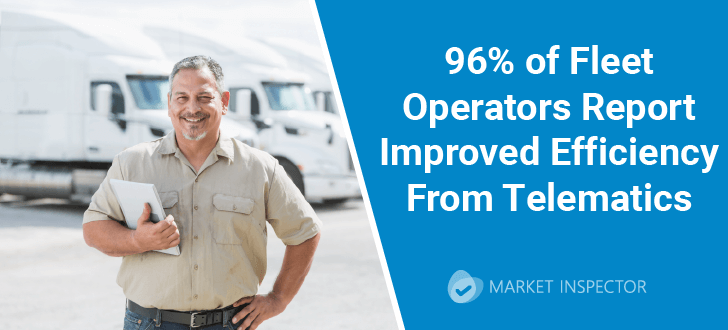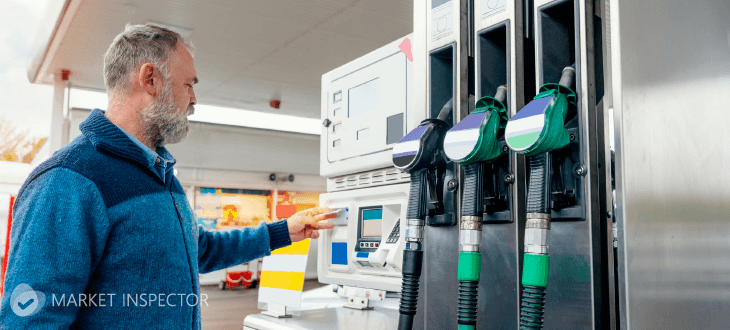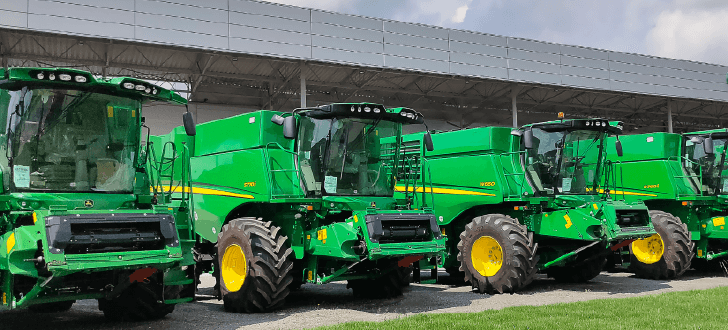Answer these simple questions and we will find you the BEST prices
Which type of solar quotes do you need?
It only takes 30 seconds
100% free with no obligation

Get up to 4 quotes from our selected suppliers by filling in only 1 form

Save money by comparing quotes and choosing the most competitive offer

Our service is 100% free and with no obligation
- Market-Inspector.co.uk
- Vehicle Tracking
- Fleet tracking
- Fleet tracking with telematics
Should You Optimise Your Fleet Tracking with Telematics?


- 96% of fleet operators report measurable improvements in operational efficiency due to telematics, with significant reductions in fuel consumption and idle times.
- Implementing AI dashcams and in-cab alerts decreased accident-related costs by 15%, improving safety and reducing insurance premiums.
- The 2024 Fleet Technology Trends Report by Verizon Connect highlights that "advanced analytics help identify risky driving behaviours, allowing fleet managers to intervene and reduce the likelihood of accidents."
We will explore the functionality of commercial vehicle telematics systems, which incorporate GPS, sensors, and sophisticated software to observe and analyse data from fleet vehicles like trucks and buses.
These systems are pivotal when implementing vehicle telematics for fleet management. They provide essential data that enhances route optimisation through real-time location tracking. This capability not only reduces mileage but also cuts down on fuel consumption. The telematics tracking feature also scrutinises engine activity to curtail idle time, thereby improving fuel efficiency and promoting better driving practices.
Such advancements in telematics also boost overall productivity by enabling fleet managers to effectively track deliveries, manage schedules, and ensure that every vehicle is used to its fullest potential, ultimately streamlining operations across various fleet vehicles. This comprehensive approach to automotive telematics is crucial for businesses seeking efficient fleet telematics solutions.
- Describe your needs
- Get free quotes
- Choose the best offer
It only takes 30 seconds

Vehicle and fleet telematics explained
Telematics in commercial vehicles integrate technologies, including GPS fleet management solutions, sensors, and software, to collect and analyse extensive data from fleet vehicles.
According to Teletrac Navman’s 2024 Fleet Technology Trends Report, this technology supports real-time tracking. It offers crucial analytics essential for operational efficiency. It highlights that organisations find GPS fleet tracking beneficial in managing operations.
When considering whether to optimise your fleet tracking with telematics, it's essential to understand the different tracker types available. Vehicle tracking telematics systems surpass standard tracking devices by providing insights into vehicle behaviour, driver habits, and maintenance needs. This enables proactive and predictive management, shifting fleet operations from merely reactive to significantly more strategic and efficient, enhancing overall fleet performance.
For fleet management telematics, there's a strong focus on integrating data across all vehicles to optimise fleet efficiency, ensure compliance, and improve driver safety.
Telematics fleet management systems utilise real-time data extensively, aiding managers in making informed decisions swiftly—crucial in dynamic sectors like logistics and delivery, as supported by the Teletrac Navman Survey 2024 which states that 60% of fleet professionals acknowledge the simplification of complex processes through AI technology in telematics.
The 2024 Fleet Technology Trends Report by Verizon Connect illuminates the intricate functionalities of telematics systems in commercial vehicles. These systems integrate advanced Wi-Fi GPS trackers, sensor technology, and comprehensive data analytics to monitor and optimise fleet operations. The report highlights, "GPS technology is a trusted tool for fleets across industries, empowering them to track vehicles in real time, manage schedules, and improve dispatch efficiencies."
This advanced tracking goes beyond simple location mapping; vehicle tracking telematics provides a detailed look into vehicle behaviour, driver habits, and maintenance needs, enhancing fleet management's operational responsiveness. The Teletrac Navman Survey 2024 elaborates on this: "96% of fleet operators report measurable improvements in operational efficiency due to telematics, with significant reductions in fuel consumption and idle times."
Best features for telematics fleet management

Real-time location tracking is one of the most valuable features of fleet telematics systems. It allows for instant route adjustments based on traffic conditions or schedule changes, thus directly impacting fuel consumption and service efficiency. Integration with other corporate systems allows for seamless operations across different departments, which enhances the functionality and responsiveness of fleet operations.
Real-time location tracking is paramount. The 2024 Fleet Technology Trends Report by Verizon Connect states, "Real-time tracking allows for the adjustment of routes on the fly, which not only improves service delivery times but also significantly reduces unnecessary fuel expenditure." This capability is critical in dynamic sectors where time and efficiency are closely tied to business success.
Moreover, telematics fleet management systems are adept at integrating with corporate systems, ensuring that information flows seamlessly between logistics, HR, and customer service departments, enhancing overall business operations.
Analytical capabilities of telematics tracking improve safety standards by identifying and mitigating risky driving patterns, offering data crucial for training programs. This capability is not only a safety measure but also fosters significant savings on fuel and maintenance by promoting efficient driving practices, as cited by The Telematics Report 2024, where 47% of respondents use AI tools to enhance these processes.
According to Verizon Connect’s whitepaper on Cutting Fleet Costs: 5 Ways Fleet Management Technology can help, in 2024, 79% of fleet respondents identified increasing costs as their biggest challenge. This is an increase from 63% in 2022, highlighting a rising trend in concerns over escalating operational expenses year over year.
Fleet fuel telematics

Fleet fuel telematics are crucial for monitoring and managing fuel efficiency across fleets. Systems that track detailed fuel usage provide data that can pinpoint where fuel consumption can be reduced, such as idling and inefficient routing. The 2024 Fleet Technology Trends Report by Verizon Connect underlines that organisations see a noticeable decrease in fuel costs by up to 10% through the adoption of telematics technologies.
Meanwhile, the Telematics Report 2024 highlighted that "telematics systems have been instrumental in reducing fleet fuel expenditures by up to 20% through optimised route planning and behaviour monitoring." These systems track detailed fuel usage, which can identify high-consumption patterns and suggest alternatives to reduce costs and improve efficiency.
Verizon Connect’s whitepaper also highlighted that fleet management technology has been reported to reduce costs and increase operational efficiency significantly. For instance, fleets using GPS tracking technology experienced a 9% reduction in fuel costs. Also, properly inflated tyres improved fuel economy by 0.6% to 3%.
Fleet safety telematics
Fleet safety telematics enhances operational safety by monitoring driver behaviour and vehicle conditions and alerting managers to unsafe practices like speeding or harsh braking.
These systems not only protect assets but also reduce the risk of accidents, significantly lowering related costs and liabilities. This is highlighted by the Teletrac Navman Survey 2024, which notes an 88% increase from the previous year in respondents recognising fuel savings as a top benefit of telematics usage.
Accident-related costs decreased by 15% due to implementing AI dashcams and in-cab alerts, which improved safety and reduced insurance premiums, as reported in Verizon Connect’s whitepaper on Cutting Fleet Costs: 5 Ways Fleet Management Technology.
The Teletrac Navman Survey 2024 discusses how telematics supports safety and compliance: "Over 50% of fleet managers have noted a reduction in accidents and safety incidents due to improved monitoring and real-time data analytics provided by telematics systems."
Fleet telematics data
The comprehensive data collected through fleet telematics devices offers invaluable insights, including detailed reports on route adherence, stop times, and speed patterns.
These metrics are vital for improving operational efficiency and compliance with regulatory standards. Detailed data analytics help businesses understand inefficiencies and optimise operations. The Telematics Report 2024 notes that data-driven decision-making is crucial for modern fleet operations.
The data from fleet telematics devices offers transformative insights for businesses. The Telematics Report 2024 notes, "Comprehensive data collection includes monitoring of route adherence, stop times, and even minute-by-minute driver behaviour, providing fleet managers with the tools to optimise operational performance and regulatory compliance."
Will your business benefit from telematics vehicle tracking?

Telematics vehicle tracking provides scalable benefits tailored to specific business needs. Companies focused on timely deliveries might value real-time tracking more highly, while those dealing with high-value goods may prioritise security features. The Telematics Report 2024 suggests that the implementation of these systems varies widely in cost, influenced by the depth of data integration and real-time tracking capabilities offered.
The applicability and benefits of telematics vehicle tracking vary by business type and need. For instance, logistics companies benefit immensely from real-time tracking for dynamic routing, while companies with high-value assets focus more on security features.
The Teletrac Navman Survey 2024 underscores that "diverse telematics applications allow businesses to tailor solutions to their specific operational needs, achieving better overall efficiency and security."
Here are some specific telematics features beneficial for most businesses:
- Real-time tracking: GPS technology enables fleet managers to monitor vehicle locations in real-time, which is crucial for efficient routing and dispatching. Thus, response times are reduced, and customer service is enhanced.
- Driver behaviour monitoring: Telematics tracks key driving behaviours, like speeding and harsh braking, providing valuable data for training drivers towards safer and more fuel-efficient habits.
- Vehicle health alerts: Telematics systems monitor vehicle diagnostics, alerting managers about maintenance needs before they escalate into costly repairs. This helps keep vehicles in peak condition and minimises downtime.
- Fuel usage tracking: Telematics analyses fuel consumption patterns to help reduce costs by optimising routes and minimising idle times.
- Geofencing: Businesses can set virtual boundaries around specific areas, with alerts triggered when vehicles enter or exit these zones, improving security and operational oversight.
When considering the Return On Investment (ROI), 46% of survey respondents observed an ROI in asset tracking within less than a year, and an impressive 94% of fleets found using GPS fleet tracking software beneficial for their operations, as per Verizon Connect’s whitepaper findings.
Additionally, labour costs decreased by 10% due to more effective routing and better monitoring of work hours, as detailed in the same report.
Van and car telematics

For businesses operating fleets of cars or vans, car telematics streamline operations by providing detailed travel data and optimising delivery routes. This technology improves operational efficiency and enhances customer satisfaction through improved service reliability and responsiveness.
Businesses with fleets of cars or vans can significantly benefit from implementing telematics to optimise fleet management. Telematics systems harness GPS tracking, data analytics, and real-time communication tools to enhance the efficiency and safety of fleet operations.
Consider a delivery service company that operates a fleet of vans across a metropolitan area. By integrating a vehicle telematics system, the company can track each van's location in real-time, ensuring that drivers take the most efficient routes to their destinations.
The telematics system can also monitor driving patterns, providing data that the company uses to train drivers on eco-friendly driving techniques, significantly reducing fuel consumption.
Truck telematics

Larger vehicles like trucks benefit significantly from truck telematics, which provides specialised features such as advanced routing algorithms that consider vehicle dimensions and load specifications, robust compliance tools for monitoring hours of service, and rest break monitoring.
Consider a long-haul trucking company that specialises in cross-country freight delivery. By employing a telematics system, the company can precisely track the real-time locations of its fleet, optimising routes based on traffic and weather conditions. This not only ensures on-time deliveries but also enhances fuel efficiency.
The telematics system also provides real-time alerts for maintenance needs, allowing the company to address mechanical issues and minimise downtime proactively. With cargo monitoring, the company ensures that sensitive loads, such as perishable food items or pharmaceuticals, are kept within the required conditions, mitigating the risk of damage and loss.
Agriculture and construction telematics

Telematics for fleet management significantly enhances productivity in sectors like agriculture and construction. Systems specialised in construction fleet telematics schedule maintenance, track usage hours, and prevent theft, which is crucial for managing high-value equipment efficiently and cost-effectively.
Consider a construction company tasked with multiple, simultaneous infrastructure projects across a region. By implementing a telematics system, the company can track the precise location and status of its heavy machinery in real-time, such as cranes, excavators, and bulldozers. This capability ensures that equipment is efficiently allocated across sites, preventing bottlenecks.
The telematics system alerts the maintenance team about the health status of each machine, enabling timely repairs before critical failures occur, which is particularly beneficial during peak construction periods.
Other fleet vehicle telematics
Telematics fleet management also applies to nontraditional fleets like motorcycles and small commercial vehicles. These fleet tracking systems ensure efficient route planning, theft prevention, and maintenance management, which is vital for small businesses or those with niche operational needs.
Imagine an urban delivery service that utilises a mixed fleet of electric bikes, motorcycles, and small vans to navigate busy city streets. The company can optimise route planning by implementing a telematics system to ensure timely deliveries despite the high-traffic environment. Real-time location tracking allows dispatchers to assign deliveries dynamically based on the nearest available driver, improving response times and customer satisfaction.
Telematics also provides crucial theft protection. Given the high risk associated with lightweight, easily accessible vehicles like bikes and motorcycles, the ability to monitor their locations continuously is invaluable. If a vehicle is stolen, the system can trigger an alert and enable tracking, significantly increasing the chances of recovery.
Fleet telematics solutions: the verdict
The market offers various fleet telematics providers. These companies have carved out reputations for providing robust solutions tailored to enhance fleet management efficiency and security. Some of the most popular brands in this sector include:
- Verizon Connect: Known for offering comprehensive fleet tracking solutions that improve efficiency and compliance across many vehicle types.
- Geotab: Specialises in scalable telematics solutions that provide in-depth vehicle data analytics and reporting.
- Fleet Complete: Offers a wide range of GPS tracking and fleet management tools that cater to various fleet sizes and types, enhancing operational efficiency.
- Teletrac Navman provides fleet management software that uses detailed telematics data to optimise routing, compliance, and fleet safety.
Based on the provided information, telematics systems are beneficial and fundamental for businesses that implement fleet monitoring solutions.
Compare multiple quotes
When considering whether to optimise your fleet tracking with telematics, one critical step is to compare multiple quotes from different providers. This cost-effective strategy ensures that you find the best fleet tracking system in the UK tailored to your specific needs.
By soliciting quotes from several fleet telematics providers, you gain a clearer perspective on the range of features. This variety allows you to assess which telematics fleet management system offers the best value for your investment. Comparing multiple quotes can help you identify providers who offer special features such as fleet safety telematics or construction fleet telematics, which might be particularly beneficial depending on the nature of your business.
Ultimately, gathering multiple quotes saves money and equips your fleet with unique tools for improved efficiency and productivity.
- Describe your needs
- Get free quotes
- Choose the best offer
It only takes 30 seconds

FAQ
Fleet management telematics involves using GPS and other technology. Gathering data from a fleet of vehicles to improve efficiency, safety, and compliance is crucial for modern fleet operations.
Costs can vary widely, influenced by the system’s complexity and the depth of data integration, ranging from simple tracking systems to advanced analytics platforms.
It collects and sends comprehensive data about vehicle location, driver behaviour, and vehicle activity to a central system, optimising fleet operations.
GPS tracking primarily monitors vehicle locations, whereas telematics encompasses a broader range of data collection, including vehicle usage, driver behaviour, and diagnostics, facilitating comprehensive fleet management. Telematics is crucial in enhancing fleet operations efficiency, safety, and compliance.

Nicole Bea Kerr is a content writer for Market Inspector, leveraging her experience in B2B journalism and editing. She is interested in bringing more awareness to sustainability and helping businesses make informed choices through insightful narratives.
We strive to connect our customers with the right product and supplier. Would you like to be part of Market Inspector?

